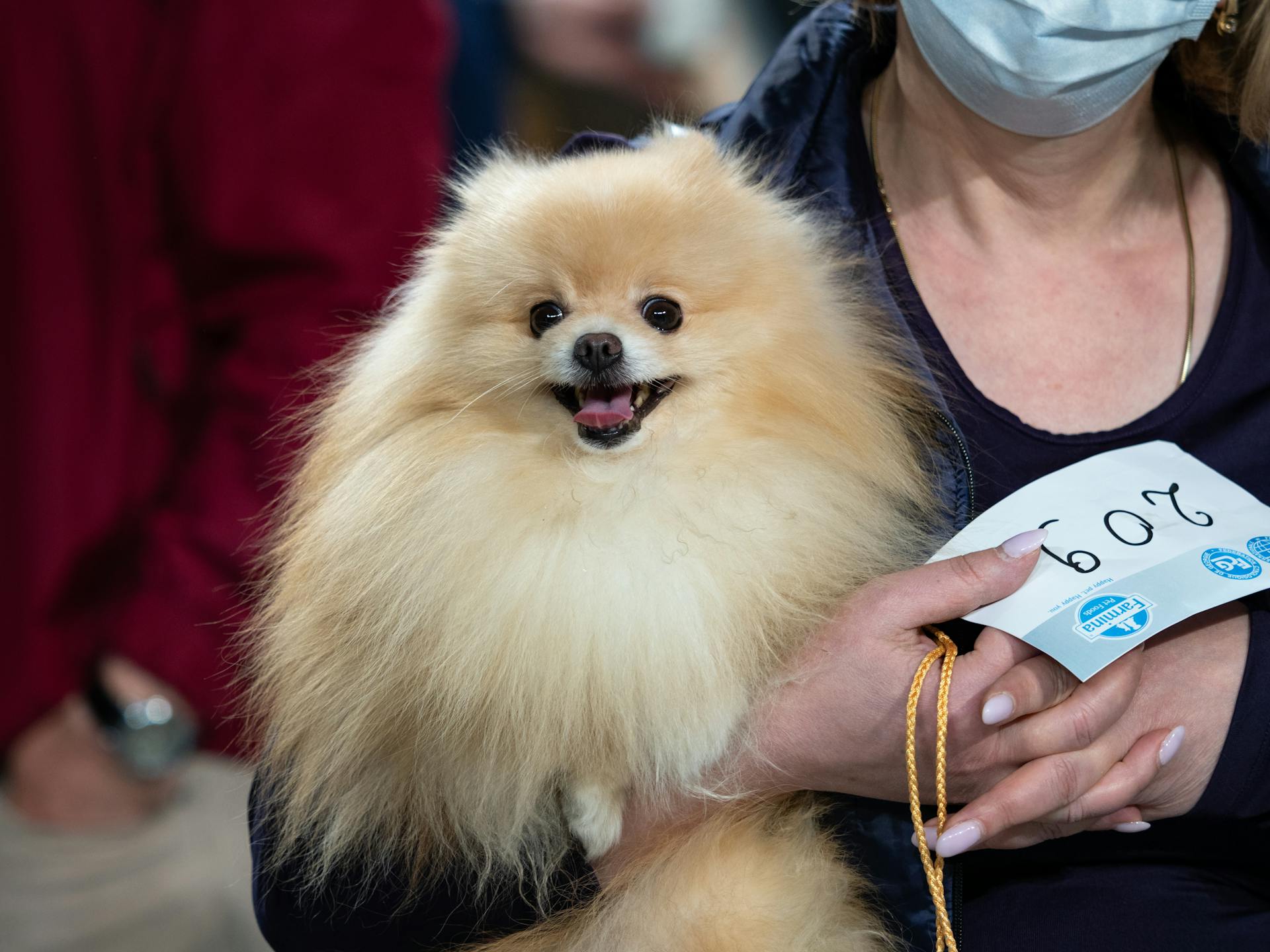
Weimaraners are prone to skin issues, which can be frustrating for owners. One of the most common skin problems is atopic dermatitis, a condition that causes intense itching and skin lesions.
Weimaraners can develop atopic dermatitis due to a genetic predisposition and environmental factors, such as pollen and dust mites. This condition can be treated with medication and lifestyle changes.
Skin fold dermatitis is another common issue in Weimaraners, particularly in areas with thick skin folds like the face and neck. If left untreated, skin fold dermatitis can lead to infections and scarring.
Regular grooming and cleaning of the skin folds can help prevent skin fold dermatitis.
Common Skin Issues
Your Weimaraner is prone to skin infections and diseases, including Malassezia dermatitis, which causes itching, redness, and brown waxy discharge in the ears, and greasy, hairless areas on the neck and throat with a characteristic odor.
Malassezia dermatitis is often accompanied by allergies, which can increase your dog's itchiness and discomfort.

Pododermatitis, or skin infection of the feet, is another painful condition that can affect your Weimaraner, causing blisters and ulcers between his toes.
This condition is especially common in pets with allergies, and if your dog licks his feet or is limping, it's essential to check for redness, moisture, or skin abrasions.
If your dog's skin looks inflamed, make an appointment to see a veterinarian right away, as he may need antibiotics or other therapy.
Coat and Allergy Issues
Dull coats and skin problems are common issues in Weimaraners.
High-quality dog kibble may claim to have a balance of nutrients, including Omega-3 fatty acids, but the truth is that these fatty acids are often destroyed during processing due to high heat.
Dry, itchy skin and unhealthy coats can be caused by Omega-3 deficient diets, which can also lead to other problems.
Omega-3 fatty acid supplements can help, but not all supplements are created equal. The ingredients used to derive the fatty acids are key.
Krill oil, for example, contains a special type of Omega-3 that boosts absorption, making it a more effective option.
Additional reading: High Fiber Dog Treats Recipe
Dull Coats Solutions

High-quality dog food may claim to have a balance of nutrients, including Omega-3 fatty acids, but it rarely has any biologically available to dogs.
Dog food is often exposed to high heat during processing, which destroys the essential fatty acids that are beneficial to your dog.
Dry, itchy skin and unhealthy coats are just a few symptoms of an Omega-3 deficient diet.
Omega-3 deficient diets can also lead to dull coats.
The solution is to start your dog on an Omega-3 fatty acid supplement.
Not all supplements are created equal, and the ingredients used to derive the fatty acids are key.
Salmon is high in Omega-3’s, but it's also high in toxins, such as lead and mercury.
You'll want to choose a supplement that uses a safe and effective source of Omega-3’s.
Common Allergy Signs
Weimaraners can suffer from allergies, and it's essential to recognize the signs early on.
Dogs with allergies may exhibit excessive scratching, chewing, or licking of the skin, often on the paws, belly, or behind the ears.
Redness, irritation, and inflammation are common symptoms of allergies in Weimaraners.
Itchiness and discomfort can lead to secondary skin infections if left untreated.
Allergies can also cause digestive issues, such as diarrhea or vomiting, in some dogs.
Health and Wellness

Weimaraners are prone to skin issues, and as a responsible owner, it's essential to be aware of the potential risks. Many diseases and health conditions are genetic, meaning they are related to your pet's breed, and Weimaraners are no exception.
Tumors, both benign and cancerous, can look like anything, so it's crucial to have all lumps and bumps checked out. A red swelling on the skin surface, like the Mast Cell Tumor mentioned in the article, can be a sign of a serious issue.
To keep your Weimaraner's skin healthy, make sure to brush her coat at least weekly. This will help remove loose hair and distribute skin oils, reducing the risk of skin problems.
Weimaraners generally have good teeth, but regular brushing is still necessary to keep them perfect. Brushing your dog's teeth at least twice a week will help prevent dental issues that can lead to skin problems.
Recommended read: Will a Hearing Aid Battery Kill a Dog

Here are some essential skin care tips for your Weimaraner:
- Brush her coat at least weekly.
- Brush her teeth at least twice a week.
- Clean her ears weekly.
- Supervise her to keep her out of trouble and away from objects she shouldn't put in her mouth.
Remember, a Weimaraner's skin is sensitive, so it's essential to keep her diet consistent and avoid giving her people food. A high-quality diet appropriate for her age will help support her skin health.
Nose and Skin Problems
Weimaraners are prone to dry noses, which can be caused by a dry climate, low humidity, illness, medications, stress, or breed disposition. This condition can be uncomfortable for your dog and may require some TLC.
You can try using natural remedies like Shea butter, Almond oil, Olive oil, Coconut oil, Castor oil, Cocoa seed butter, Avocado oil, Beeswax, or Unscented oils to help moisturize your dog's nose. I've heard great things about Bliss Bit!Nose Butter, which is a thick and stiff consistency that can work well on tough skin.
If your Weimaraner is experiencing skin infections like yeast dermatitis or pododermatitis, it's essential to catch them early and seek veterinary care. These conditions can cause itching, redness, and discomfort, and may require antibiotics or other therapy to clear up.
You might enjoy: Liver Nose Rhodesian Ridgeback
Weimaraner Pyoderma

Weimaraners are prone to pyoderma, a bacterial infection of the skin that can affect any part of their body.
This condition can range from very mild to severe and can lead to discomfort.
A staph bacterium is the most common cause of pyoderma in Weimaraners.
Other contributing factors in various pyodermas are parasites, trauma, allergies, fungal infections, hyperthyroidism, immune disorders, cancer, and other idiopathic causes.
Signs and symptoms of pyoderma include licking and scratching at the affected areas, redness, painful lesions that may be ulcerated, pustules, and draining sores.
As the condition advances, there could be dry crusted areas with loss of hair and an odor due to infection.
A complete physical examination by your veterinarian will include a complete medical history of your dog's symptoms.
Testing may include cytology and a skin culture of the affected area(s), as well as a complete blood count and other blood analysis plus a test for allergies.
For your interest: Ferret Distemper Symptoms

An antibiotic to kill the bacterial infection may be prescribed along with an anti-bacterial shampoo and/or anti-bacterial topical creams which contain benzoyl peroxide, ethyl alcohol, or chlorhexidine.
Parasites are a common cause of pyoderma, so a preventative program should be followed to avoid infestation, per the advice of your vet.
Is Your Dog's Nose Dry?
A dry dog nose can be a pretty uncomfortable and unsightly condition for your furry friend.
Dry dog noses can range from a bit dry to the extremely dry nose condition known as nasal hyperkeratosis.
A dry nose can be caused by a dry climate, low humidity, illness, medications, stress or breed disposition.
If your dog's nose is extremely dry, it might be due to nasal hyperkeratosis, an idiopathic condition that causes nose tissue to grow uncontrollably.
You can try using natural remedies like Shea butter, Almond oil, Olive oil, Coconut oil, Castor oil, Cocoa seed butter, Avocado oil, Beeswax, or Unscented to help moisturize your dog's dry nose.
A different take: Nasal Surgery for French Bulldogs
Mast Cell Tumor and Other Issues

Mast Cell Tumors are a particularly nasty type of skin cancer found more often in Weimaraners. The sooner they are surgically removed, the better.
Mast Cell Tumors often look just like other kinds of skin lumps and lesions, making them tricky to diagnose.
Early detection and removal is critical, as many cancers are cured by surgically removing them.
Weimaraners can inherit or develop a number of different eye conditions, some of which can be extremely painful.
Cataracts are one of the eye conditions that can cause blindness if not treated right away.
For more insights, see: Doberman Pinscher Skin Conditions
Frequently Asked Questions
Why is my Weimaraner so itchy?
Itchy skin in Weimaraners is often caused by allergies to grains, grasses, flea bites, or gnat bites, leading to excessive scratching and welts
What is the Weimaraner autoimmune disease?
Weimaraner immunodeficiency syndrome is a rare genetic disorder that affects a dog's immune system, causing low levels of certain proteins and impaired white blood cell function. This condition can lead to recurring infections and other health issues in affected Weimaraners.
Why does my Weimaraner have bumps?
Weimaraners can develop bumps due to fatty tumors (lipomas), which are more common in middle-aged and older dogs, especially those that are overweight or larger in size. If you're concerned about your dog's bumps, it's a good idea to consult with a veterinarian to determine the cause and best course of action.
Sources
- https://iheartdogs.com/improve-your-weimaraners-skin-coat-with-this-one-simple-hack/
- https://iheartdogs.com/giving-this-to-your-weimaraner-daily-could-help-alleviate-painful-skin-allergies/
- https://theblissfuldog.com/products/weimaraner-tube-combo
- https://knoji.com/article/weimaraner-dogs-can-be-afflicted-with-pyoderma/
- https://familyfriendsvets.com/client-resources/breed-info/weimaraner/
Featured Images: pexels.com


